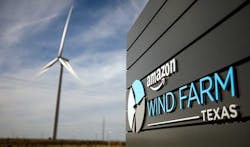Amazon today announced a massive investment in solar and wind power that will accelerate its plans to power its AWS cloud infrastructure with renewable energy. The company unveiled 26 new utility-scale wind and solar energy projects totaling 3.4 gigawatts (GW) of electricity.
“Amazon is helping fight climate change by moving quickly to power our businesses with renewable energy,” said Jeff Bezos, Amazon founder and CEO. “With a total of 127 solar and wind projects, Amazon is now the biggest corporate buyer of renewable energy ever. We are on a path to running 100% of our business on renewable energy by 2025 — five years ahead of our original target of 2030.
The power deals announced today bring Amazon’s total investment in renewable energy in 2020 to 35 projects and more than 4 GW of capacity. The company has now invested in 6.5 GW of wind and solar projects that will enable the company to supply its operations with more than 18 million megawatt hours (MWh) of renewable energy annually.
The Cloud’s Key Role in Climate Change
The Amazon purchases reinforces how cloud computing is a major player in the shift to renewable energy to power the Internet economy, with AWS, Google, Facebook, Amazon, Microsoft and Apple making public commitments to sourcing renewable energy for their cloud data centers. These companies have used power purchase agreements (PPAs) like those announced today to buy wind and solar energy to offset their data center energy use.
Amazon’s commitment comes 18 months after it was critiqued by Greenpeace, which said the company was falling short of commitment to support its fast-growing cloud infrastructure with green power. In late 2019, Bezos announced a Climate Pledge to invest $10 billion in sustainability and have Amazon become a net zero carbon company by 2040.
The new power deals are a big step toward meeting those goals. The 26 new wind and solar projects are located in Australia, France, Germany, Italy, South Africa, Sweden, the U.K., and the U.S. The new projects are Amazon’s first in France, Germany, Italy, and South Africa. In the U.S., Amazon has now enabled wind and solar projects in California, Delaware, Illinois, Indiana, Kansas, Kentucky, Nebraska, North Carolina, Ohio, Texas, and Virginia.
Beyond renewable energy, one of Amazon’s Climate Pledge investments has been in CarbonCure, which takes CO2 produced by large emitters like refineries and chemically mineralizes it during the concrete manufacturing process to make greener and stronger concrete. The process reduces the volume of cement required in the mixing of concrete, while also permanently removing CO2 from the atmosphere. Amazon says it it already using CarbonCure technology in its HQ2 office projects in Northern Virginia.
The Cloud’s Key Role in Climate Change
Amazon now has a total of 127 renewable energy projects globally, including 59 utility-scale wind and solar renewable energy projects and 68 solar rooftops on fulfillment centers and sort centers around the globe.
The company’s announcement was hailed by the Renewable Energy Buyers Alliance (REBA), which works to prove broader access to renewable energy for cloud and data center customers.
“Private sector investment is essential to scaling renewable energy at the pace necessary to drive global climate action,” said Miranda Ballentine, CEO of REBA. “The U.S.-based projects alone make Amazon’s announcement 270% larger than the largest corporate procurement announcement from a single off-taker to date, and showcase the company’s leadership and commitment to a clean and prosperous energy future.”
There’s no question that Amazon is now one of the largest and most important purchasers of renewable energy. The ongoing question, amid a surge in climate-related wildfires and hurricanes in 2020, is whether Amazon’s green energy buying can keep pace with the growth of its AWS cloud. In a report last year, Greenpeace argued that Amazon’s pledged commitment to sustainability was falling behind the growth of its data center footprint, especially in Northern Virginia.
Amazon’s announcements come during a massive boom in data center construction in Northern Virginia, the largest cloud market and home to the largest concentration of AWS data centers. There are ongoing concerns about the volume of renewable energy generation by Dominion Energy and whether it can meet the extraordinary growth of the data center industry in Northern Virginia. As more details emerge about these AWS power deals, the impact on its footprint in Virginia will be the focus of ongoing interest.







